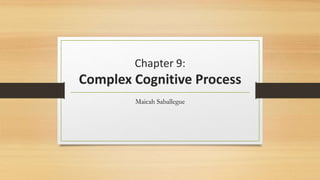
Metacognitiion
- 1. Chapter 9: Complex Cognitive Process Maicah Saballegue
- 2. In this chapter we will discuss a number of executive control processes…. • Executive Control Processes are the selective attention, rehearsal, elaboration and organization that influence encoding, storage and retrieval of information in memory.
- 3. Such as … • Attention Rehearsal Elaborating
- 4. Metacognition – is the awareness and understanding of one's own thought processes.
- 5. • According to John Flavell, Metacognition is higher order knowledge about your own thinking a well as the ability to use this ability to manage your own cognitive processes such as comprehension and problem solving.
- 6. • People differ in how well and how they quickly they learn because they differ in their metacognitive knowledge and skills.
- 9. Metacognition involves 3 kinds of knowledge we discussed earlier… • Declarative knowledge – “Knowing what to do” about yourself as a learner, the factors that influence your learning and memory. • Procedural knowledge – “Knowing how” to use the strategies. • Self-regulatory knowledge – “Knowing the conditions” when and why, to apply the procedures and strategies.
- 10. There are 3 essential skills in Metacognition… • Planning Monitoring Evaluating
- 12. • Of course, we don’t have to be metacognitive all the time. Some actions become routine or habits. • Metacognition is most useful when tasks are challenging, but not too difficult. • Experts in a particular field plan, monitor and evaluate as Second nature.
- 13. • Metacognition involves choosing the best way to approach a learning task. Students with good metacognitive skills set goals, organize their activities, select among various approaches to learning and change strategies if needed.
- 14. • Metacognitive abilities begin to develop around ages 5 to 7 and improve throughout school. • Working to improve metacognitive skills can be especially important for students who often have trouble in school.
- 15. Metacognitive Development for younger students. • KWL – a cooperative strategy used by many teachers to guide reading and inquiry. • K – What do I already know about this subject • W – what do I want to know • L – at the end of the reading or inquiry, What have I learned?
- 16. Metacognitive Development for secondary students and college students… • Teachers can incorporate metacognitive questions into their lessons, lectures and assignments. Example: • What are my intellectual strengths and weaknesses? • How can I motivate myself to learn when I need to?
- 17. Learning Strategies • A special kind of procedural knowledge – knowing how to approach learning tasks.
- 18. Some teachers think that memorizing is learning, this may explain why many students cling to flash cards and memorizing – but they don’t know what else to do.
- 19. The way something is learned in the first place greatly influences how readily we remember the information and how can we appropriately apply the knowledge later. 1. Students must be Cognitively engaged in order to learn. Then, they have to focus attention on the relevant or important aspects of the material.
- 20. 2. They have to invest effort, make connections, elaborate, translate, invent organize and recognize in order to think. And process deeply the greater the practice and processing, the stronger the learning.
- 21. • 3. Students must regulate and monitor their own learning – keep track of what is making sense and notice when a new approach is needed, that is, they must be metacognitive.
- 22. Being strategic about learning… • There are thousands of strategies, some are general and taught in school, such as summarizing and outlining. • Others are specific to the subject such as using mnemonic…
- 23. Example: “My Very Educated Mother Just Served Us Nachos” Mars Venus Earth Mars Jupiter Saturn Uranus Neptune
- 24. Deciding what is important • Distinguishing the main idea from the less important information is not always easy. Often students focus on the “seductive details” or the concrete examples, perhaps because they are more interesting. Teachers can give students practice using signals in texts such as headings, bold words, outlines or other indicators to identify key concepts and main ideas.
- 25. Underlining and Highlighting • The most frequent but ineffectively used strategies among college students. • One common problem is that students underline or highlighting too much.
- 26. Taking notes • It focuses attention during class • Makes you construct meaning from what are you hearing, seeing or reading, so you elaborate, translate into your own words and remember. • It provides extended external storage that allows you to return and review
- 27. Visual tools for organizing • Using concept maps etc.
- 28. Reading Strategies • A strategy that can be used in reading literature is CAPS: C – who are the characters? A – what is the aim of the story? P – what problem happens? S – how is the problem solved?
- 29. Production deficiencies • Students learn problem-solving strategies, but do not apply them when they could or should.
- 30. Problem Solving • Problem – any situation in which you are trying to reach some goal and must find a mean to do. • Problem Solving – creating news solutions for problems.
- 32. Give Examples: • Students benefit from seeing many different kinds of example problems worked out correctly for them.